Features
HOTEL SCHOOL NOSTALGIA LIVES ON… – Part 21
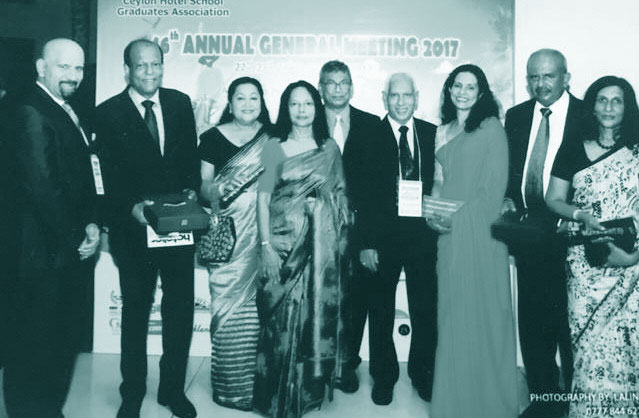
CONFESSIONS OF A GLOBAL GYPSY
By Dr. Chandana (Chandi) Jayawardena DPhil
President – Chandi J. Associates Inc. Consulting, Canada
Founder & Administrator – Global Hospitality Forum
chandij@sympatico.ca
The 50th Anniversary of CHSGA
On October 16, 2021 I attended another annual general meeting (AGM) of the Ceylon Hotel School Graduates Association (CHSGA). This week, both CHSGA and I celebrated 50 years in hospitality. As a Past President of CHSGA (1985-1986) I am proud of the work done by all my 27 predecessors and the current executive committee, which includes many of my past students of the Ceylon Hotel School (CHS). They have taken the association to 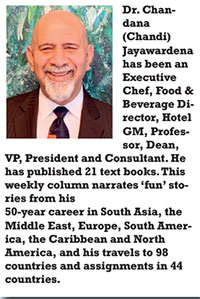 new heights of professionalism, efficiency and innovation.
new heights of professionalism, efficiency and innovation.
Usually, the CHSGA AGM is a three-day event of professional, social and fellowship celebrations. Due to the pandemic, we had to settle for less via Zoom; but the show went on. Considering the humble beginnings of CHSGA in 1971 at the CHS hostel with fewer than 50 members, it is impressive that CHSGA now has over 1,200 professional members and is going from strength to strength.
Like many other hospitality institutions, CHSGA is affected by the pandemic. However, its commitment to professional development of its members through centres for excellence and support to the Sri Lanka Institute of Tourism and Hotel Management (SLITHM) and students continues commendably. CHSHA due to previous fund-raising efforts and projects such as the Hotel Show, continues to be financially sound.
A nostalgic interview
On October 17, 2021, the 3,550-member strong (from over 100-countries) Global Hospitality Forum (GHF) hosted its first-ever online Q&A session. It was organized with the assistance from the International Tourism Volunteers Association (ITVA). I interviewed a CHS graduate of the first batch (1966-1969), who taught me hospitality 50 years ago. As a former student of Mr. Rohan De Silva Jayasundara, it was indeed nostalgic and an honour for me to do this interview. With a view of inspiring the audience, I asked of series of questions about my lecturer’s amazing career in hospitality education in seven countries. Listening to this legend in International Hospitality Education talk about his career in Sri Lanka, West Germany, Brunei, Australia, Cook Islands, Vanuatu, and Marshall Islands was a rare opportunity.
For the benefit of those who missed the webinar, the organizers will post its video clip on Facebook pages of GHF and ITVA. Encouraged with its popularity, it was decided to hold such online Q&A sessions with hospitality legends (with over 50 years’ experience in distinguished careers), every month. On November 14, the Global Hospitality Forum’s Q&A session will be with Mahinda Ratnayake who as General Manager, opened the first ever five-star resort in Sri Lanka in 1982 – Triton Hotel. These sessions are open for anyone interested, free of charge.
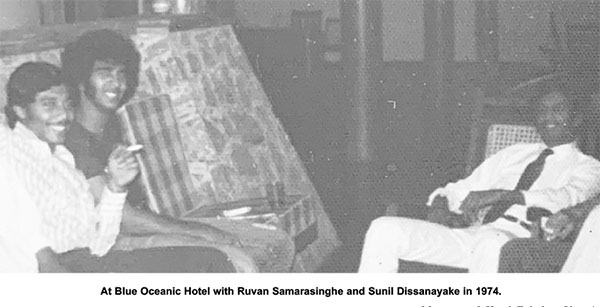
Interviews at Hotel Lanka Oberoi
In 1974 I did well at my first interview for a post of chef de partie at Hotel Lanka Oberoi which was getting ready to open the largest hotel in Sri Lanka. After the interview I was short listed for a kitchen practical test held at Hotel Renuka where the Executive Chef of Lanka Oberoi and his senior brigade stayed during the hotel’s pre-opening stage. The practical test was to prepare a full meal from a surprise menu given to the finalists five minutes before its commencement. I thought I did well but was not chosen. Later, I heard that the successful candidate was Das Perumpaladas, the Executive Chef of Hotel Renuka and a graduate of the CHS, three years my senior. I realized that they valued his executive chef experience in a small three-star hotel gained over three years.
A week later I was called for two more interviews – one of them at Hotel Lanka Oberoi. The other was at the head office of Whittall Boustead Ltd./Ceylon Holiday Resorts, the owners of my favourite, Bentota Beach and its sister hotel, Coral Gardens. At Hotel Lanka Oberoi I was interviewed by Mr. Joe Madawela, the charismatic Personnel Manager, who was in charge of hiring over 600 employees for the hotel opening. He told me that although I did not make it as a chef de partie, I would be a good candidate for a post such as a bar supervisor. He also told me that if I do well there, I may get an opportunity in a couple of years to be further trained at the Oberoi School of Hotel Management in India for two years. That was the key to become a hotel manager within this regional hotel chain. I agreed to think about it and get back within a week if I was interested.
Eleven years later, I met Joe for the second time. In 1985, he was managing the Queens Hotel in Kandy on a secondment from Hotel Lanka Oberoi. I was then the General Manager of the two largest hotels of John Keells Group – The Lodge and The Village, Habarana. I was also the Founding President of Rajarata Hotels Association (North Central Province). The hoteliers in Kandy were thinking of forming a similar association and sought my advice. To advise them and share our best practices from the NCP, I made a couple of trips to Kandy. I enjoyed chatting with Joe during one of those visits. He had a remarkable memory and narrated details of my interview with him 11 years earlier saying he was disappointed that I did not take his offer in 1974 as he thought that I would have done well with Oberoi. Four years later in 1989, I finally accepted an ‘expatriate contract’ offer from the Oberoi Group and became the Food and Beverage Manager of Hotel Babylon Oberoi in Baghdad, Iraq. Of the ten managers who reported to me, half were graduates of the Oberoi School of Hotel Management in India.
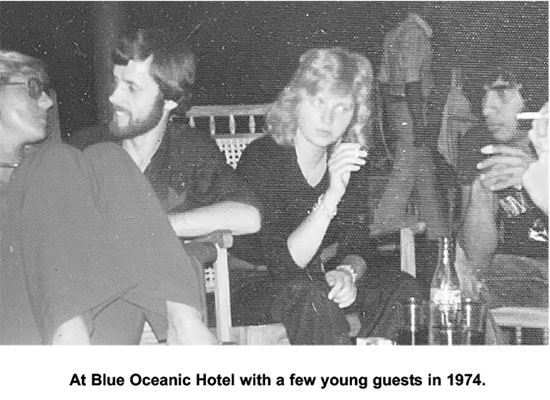
An offer from Bentota Beach Hotel
When I went for the interview at Whittall Boustead, I was immediately offered the post of Trainee Executive Chef (number three in the kitchen) at Bentota Beach Hotel. Mr. Gilbert Paranagama, the Director in charge of their two hotels told me that the management of the hotel was impressed with my work during my recent CHS internship. He made a good offer of a 500-rupee salary and free board and lodging at the executive quarters within the hotel. I was very pleased and accepted the offer. He also briefly introduced me to the Company Chairman, Mr. Sanmugam Cumaraswamy, a well-known Chartered Accountant and businessman.
Leaving Colombo
When I gave notice and handed over my resignation from Havelock Tourinn, the General Manager, Mr. C. Nagendra was very disappointed. He was shocked that someone would leave the position assistant manager of a city hotel to become number three chef in a resort hotel. However, having made my career plan, I was convinced that I was making the right move. Leaving Colombo was not easy. It was my birth place and I lived there for the first 20 years of my life. With my career move, and the desire to live in different parts of Sri Lanka, I knew that I would miss my family, friends, Judo club, many social events and entertainment.
I kept in touch with many of my CHS friends now scattered around the country and students from junior CHS batches who were continuing in Colombo. The friendships that commenced in 1971 at CHS, have now continued for over 50 years. Since 2011, I administered a private Facebook group I founded. It is branded as ‘CHS Lord Veterans’, where nearly 100 CHS colleagues who graduated with the original three-year diploma between 1969 and 1976, are connected around the world. The members of this exclusive group regularly share past, present and future posts. Most are retired now and sadly over a dozen have passed away in recent years. Another recent initiative is a WhatsApp group branded as, ‘Seftonites – 66-76’ exclusively for those CHS colleagues who lived in our good old hostel – Sefton, named after an original expatriate faculty member. This WhatsApp group is very active with several general posts and comments every day. The bonding we made at CHS is very special and the CHS nostalgia lives on…
A Brief Romance in Negombo
 In between my departure from Colombo and settling in Bentota, I had a free long weekend. I planned to spend it at the Katunayake airport bidding farewell to my CHS batch mate, Neil Maurice who was migrating to Australia. Almost all our batch came to this farewell and we made it a ‘one for the road’ booze party at the airport to the displeasure of the airport security guards. Our ‘Dutch courage’ certainly helped us to bravely ignore them.
In between my departure from Colombo and settling in Bentota, I had a free long weekend. I planned to spend it at the Katunayake airport bidding farewell to my CHS batch mate, Neil Maurice who was migrating to Australia. Almost all our batch came to this farewell and we made it a ‘one for the road’ booze party at the airport to the displeasure of the airport security guards. Our ‘Dutch courage’ certainly helped us to bravely ignore them.
After that, I planned to spend two days at Blue Oceanic Hotel in Negombo with two friends. One of my high school mates, Ruvan Samarasinghe (now the Managing Director at Jetwing Hotels) was the Manager of this first hotel built by Mr. Herbert Cooray for his Jetwing Group. One of my batchmates, Sunil Dissanayake (now the CEO of BMICH) was the Front Office Manager. Like all Sri Lankan hoteliers, Ruvan and Dissa were very hospitable. They hosted me generously.
On my first evening at Blue Oceanic, Ruvan invited me for dinner after drinks at the bar. A few young Swedish tourists who were very friendly asked why we were laughing so much and joined our table. A 19-year-old girl, whose nickname was Blondie, asked me, “Chandi, what kind of music is played by the hotel band?” When I told her that it was Calypso from Trinidad and Tobago, she asked me, “Can you dance to this music?” “Yes, I will show you.” I was quick to grab her before my friends got ideas and took her to the dance floor to show her how it’s done. We later went for a long care-free, barefoot beach walk counting fishing boats and the stars on a beautiful moon-lit night.
I met those friendly tourists again the next morning and ended up hanging out with them on the beach the whole day. The next day I had to leave early for Bentota to begin my new job at Bentota Beach Hotel. When I said goodbye, Blondie promised “I will write to you” and did so regularly for the next three years. We became pen pals until she returned to Sri Lanka in 1977 for a three-week holiday in search of her soulmate. Blondie was my first ‘serious’ girlfriend.
Features
Inescapable need to deal with the past
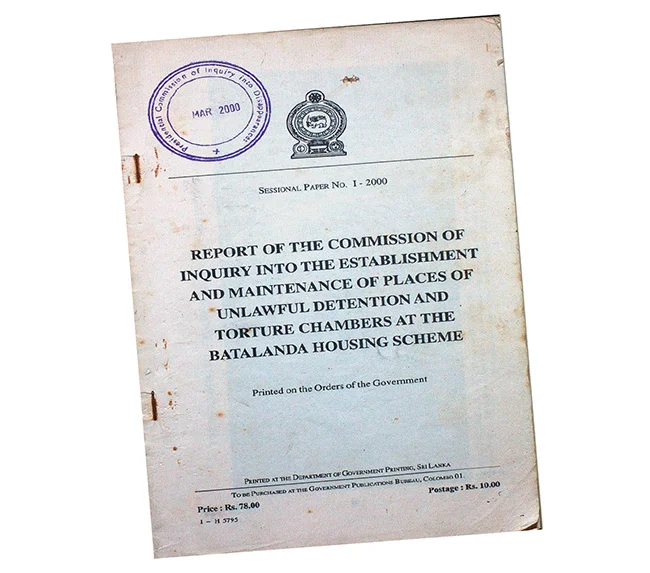
by Jehan Perera
The sudden reemergence of two major incidents from the past, that had become peripheral to the concerns of people today, has jolted the national polity and come to its centre stage. These are the interview by former president Ranil Wickremesinghe with the Al Jazeera television station that elicited the Batalanda issue and now the sanctioning of three former military commanders of the Sri Lankan armed forces and an LTTE commander, who switched sides and joined the government. The key lesson that these two incidents give is that allegations of mass crimes, whether they arise nationally or internationally, have to be dealt with at some time or the other. If they are not, they continue to fester beneath the surface until they rise again in a most unexpected way and when they may be more difficult to deal with.
In the case of the Batalanda interrogation site, the sudden reemergence of issues that seemed buried in the past has given rise to conjecture. The Batalanda issue, which goes back 37 years, was never totally off the radar. But after the last of the commission reports of the JVP period had been published over two decades ago, this matter was no longer at the forefront of public consciousness. Most of those in the younger generations who were too young to know what happened at that time, or born afterwards, would scarcely have any idea of what happened at Batalanda. But once the issue of human rights violations surfaced on Al Jazeera television they have come to occupy centre stage. From the day the former president gave his fateful interview there are commentaries on it both in the mainstream media and on social media.
There seems to be a sustained effort to keep the issue alive. The issues of Batalanda provide good fodder to politicians who are campaigning for election at the forthcoming Local Government elections on May 6. It is notable that the publicity on what transpired at Batalanda provides a way in which the outcome of the forthcoming local government elections in the worst affected parts of the country may be swayed. The problem is that the main contesting political parties are liable to be accused of participation in the JVP insurrection or its suppression or both. This may account for the widening of the scope of the allegations to include other sites such as Matale.
POLITICAL IMPERATIVES
The emergence at this time of the human rights violations and war crimes that took place during the LTTE war have their own political reasons, though these are external. The pursuit of truth and accountability must be universal and free from political motivations. Justice cannot be applied selectively. While human rights violations and war crimes call for universal standards that are applicable to all including those being committed at this time in Gaza and Ukraine, political imperatives influence what is surfaced. The sanctioning of the four military commanders by the UK government has been justified by the UK government minister concerned as being the fulfilment of an election pledge that he had made to his constituents. It is notable that the countries at the forefront of justice for Sri Lanka have large Tamil Diasporas that act as vote banks. It usually takes long time to prosecute human rights violations internationally whether it be in South America or East Timor and diasporas have the staying power and resources to keep going on.
In its response to the sanctions placed on the military commanders, the government’s position is that such unilateral decisions by foreign government are not helpful and complicate the task of national reconciliation. It has faced criticism for its restrained response, with some expecting a more forceful rebuttal against the international community. However, the NPP government is not the first to have had to face such problems. The sanctioning of military commanders and even of former presidents has taken place during the periods of previous governments. One of the former commanders who has been sanctioned by the UK government at this time was also sanctioned by the US government in 2020. This was followed by the Canadian government which sanctioned two former presidents in 2023. Neither of the two governments in power at that time took visibly stronger stands.
In addition, resolutions on Sri Lanka have been a regular occurrence and have been passed over the Sri Lankan government’s opposition since 2012. Apart from the very first vote that took place in 2009 when the government promised to take necessary action to deal with the human rights violations of the past, and won that vote, the government has lost every succeeding vote with the margins of defeat becoming bigger and bigger. This process has now culminated in an evidence gathering unit being set up in Geneva to collect evidence of human rights violations in Sri Lanka that is on offer to international governments to use. This is not a safe situation for Sri Lankan leaders to be in as they can be taken before international courts in foreign countries. It is important for Sri Lanka’s sovereignty and dignity as a country that this trend comes to an end.
COMPREHENSIVE SOLUTION
A peaceful future for Sri Lanka requires a multi-dimensional approach that addresses the root causes of conflict while fostering reconciliation, justice, and inclusive development. So far the government’s response to the international pressures is to indicate that it will strengthen the internal mechanisms already in place like the Office on Missing Persons and in addition to set up a truth and reconciliation commission. The difficulty that the government will face is to obtain a national consensus behind this truth and reconciliation commission. Tamil parties and victims’ groups in particular have voiced scepticism about the value of this mechanism. They have seen commissions come and commissions go. Sinhalese nationalist parties are also highly critical of the need for such commissions. As the Nawaz Commission appointed to identify the recommendations of previous commissions observed, “Our island nation has had a surfeit of commissions. Many witnesses who testified before this commission narrated their disappointment of going before previous commissions and achieving nothing in return.”
Former minister Prof G L Peiris has written a detailed critique of the proposed truth and reconciliation law that the previous government prepared but did not present to parliament.
In his critique, Prof Peiris had drawn from the South African truth and reconciliation commission which is the best known and most thoroughly implemented one in the world. He points out that the South African commission had a mandate to cover the entire country and not only some parts of it like the Sri Lankan law proposes. The need for a Sri Lankan truth and reconciliation commission to cover the entire country and not only the north and east is clear in the reemergence of the Batalanda issue. Serious human rights violations have occurred in all parts of the country, and to those from all ethnic and religious communities, and not only in the north and east.
Dealing with the past can only be successful in the context of a “system change” in which there is mutual agreement about the future. The longer this is delayed, the more scepticism will grow among victims and the broader public about the government’s commitment to a solution. The important feature of the South African commission was that it was part of a larger political process aimed to build national consensus through a long and strenuous process of consultations. The ultimate goal of the South African reconciliation process was a comprehensive political settlement that included power-sharing between racial groups and accountability measures that facilitated healing for all sides. If Sri Lanka is to achieve genuine reconciliation, it is necessary to learn from these experiences and take decisive steps to address past injustices in a manner that fosters lasting national unity. A peaceful Sri Lanka is possible if the government, opposition and people commit to truth, justice and inclusivity.
Features
Unleashing Minds: From oppression to liberation

By Anushka Kahandagamage
 Education should be genuinely ‘free’—not just in the sense of being free from privatisation, but also in a way that empowers students by freeing them from oppressive structures. It should provide them with the knowledge and tools necessary to think critically, question the status quo, and ultimately liberate themselves from oppressive systems.
Education should be genuinely ‘free’—not just in the sense of being free from privatisation, but also in a way that empowers students by freeing them from oppressive structures. It should provide them with the knowledge and tools necessary to think critically, question the status quo, and ultimately liberate themselves from oppressive systems.
Education as an oppressive structure
Education should empower students to think critically, challenge oppression, and envision a more just and equal world. However, in its current state, education often operates as a mechanism of oppression rather than liberation. Instead of fostering independent thinking and change, the education system tends to reinforce the existing power dynamics and social hierarchies. It often upholds the status quo by teaching conformity and compliance rather than critical inquiry and transformation. This results in the reproduction of various inequalities, including economic, racial, and social disparities, further entrenching divisions within society. As a result, instead of being a force for personal and societal empowerment, education inadvertently perpetuates the very systems that contribute to injustice and inequality.
Education sustaining the class structure
Due to the widespread privatisation of education, the system continues to reinforce and sustain existing class structures. Private tuition centres, private schools, and institutions offering degree programmes for a fee all play a significant role in deepening the disparities between different social classes. These private entities often cater to the more affluent segments of society, granting them access to superior education and resources. In contrast, students from less privileged backgrounds are left with fewer opportunities and limited access to quality education, exacerbating the divide between the wealthy and the underprivileged. This growing gap in educational access not only limits social mobility but also perpetuates a cycle where the privileged continue to secure better opportunities while the less fortunate struggle to break free from the constraints of their socio-economic status.
Gender Oppression
Education subtly perpetuates gender oppression in society by reinforcing stereotypes, promoting gender insensitivity, and failing to create a gender-sensitive education system. And some of the policymakers do perpetuate this gender insensitive education by misinforming people. In a recent press conference, one of the former members of Parliament, Wimal Weerawansa, accused gender studies of spreading a ‘disease’ among students. In the year 2025, we are still hearing such absurdities discouraging gender studies. It is troubling and perplexing to hear such outdated and regressive views being voiced by public figures, particularly at a time when societies, worldwide, are increasingly embracing diversity and inclusion. These comments not only undermine the importance of gender studies as an academic field but also reinforce harmful stereotypes that marginalise individuals who do not fit into traditional gender roles. As we move forward in an era of greater social progress, such antiquated views only serve to hinder the ongoing work of fostering equality and understanding for all people, regardless of gender identity.
Students, whether in schools or universities, are often immersed in an educational discourse where gender is treated as something external, rather than an essential aspect of their everyday lives. In this framework, gender is framed as a concern primarily for “non-males,” which marginalises the broader societal impact of gender issues. This perspective fails to recognise that gender dynamics affect everyone, regardless of their gender identity, and that understanding and addressing gender inequality is crucial for all individuals in society.
A poignant example of this issue can be seen in the recent troubling case of sexual abuse involving a medical doctor. The public discussion surrounding the incident, particularly the media’s decision to disclose the victim’s confidential statement, is deeply concerning. This lack of respect for privacy and sensitivity highlights the pervasive disregard for gender issues in society.
What makes this situation even more alarming is that such media behaviour is not an isolated incident, but rather reflects a broader pattern in a society where gender sensitivity is often dismissed or ignored. In many circles, advocating for gender equality and sensitivity is stigmatised, and is even seen as a ‘disease’ or a disruptive force to the status quo. This attitude contributes to a culture where harmful gender stereotypes persist, and where important conversations about gender equity are sidelined or distorted. Ultimately, this reflects the deeper societal need for an education system that is more attuned to gender sensitivity, recognising its critical role in shaping the world students will inherit and navigate.
To break free from these gender hierarchies there should be, among other things, a gender sensitive education system, which does not limit gender studies to a semester or a mere subject.
Ragging
The inequality that persists in class and regional power structures (Colombo and non-Colombo division) creeps into universities. While ragging is popularly seen as an act of integrating freshers into the system, its roots lie in the deeply divided class and ethno-religious divisions within society.
In certain faculties, senior students may ask junior female students to wear certain fabrics typically worn at home (cheetta dresses) and braid their hair into two plaits, while male students are required to wear white, long-sleeved shirts without belts. Both men and women must wear bathroom slippers. These actions are framed as efforts to make everyone equal, free from class divisions. However, these gendered and ethicised practices stem from unequal and oppressive class structures in society and are gradually infiltrating university culture as mechanisms of oppression.The inequality that persists in gradually makes its way into academic institutions, particularly universities.
These practices are ostensibly intended to create a sense of uniformity and equality among students, removing visible markers of class distinction. However, what is overlooked is that these actions stem from deeply ingrained and unequal social structures that are inherently oppressive. Instead of fostering equality, they reinforce a system where hierarchical power dynamics in the society—rooted in class, gender, and region—are confronted with oppression and violence which is embedded in ragging, creating another system of oppression.
Uncritical Students
In Sri Lanka, and in many other countries across the region, it is common for university students to address their lecturers as ‘Sir’ and ‘Madam.’ This practice is not just a matter of politeness, but rather a reflection of deeply ingrained societal norms that date back to the feudal and colonial eras. The use of these titles reinforces a hierarchical structure within the educational system, where authority is unquestioned, and students are expected to show deference to their professors.
Historically, during colonial rule, the education system was structured around European models, which often emphasised rigid social distinctions and the authority of those in power. The titles ‘Sir’ and ‘Madam’ served to uphold this structure, positioning lecturers as figures of authority who were to be respected and rarely challenged. Even after the end of colonial rule, these practices continued to permeate the education system, becoming normalised as part of the culture.
This practice perpetuates a culture of obedience and respect for authority that discourages critical thinking and active questioning. In this context, students are conditioned to see their lecturers as figures of unquestionable authority, discouraging dialogue, dissent, or challenging the status quo. This hierarchical dynamic can limit intellectual growth and discourage students from engaging in open, critical discussions that could lead to progressive change within both academia and society at large.
Unleashing minds
The transformation of these structures lies in the hands of multiple parties, including academics, students, society, and policymakers. Policymakers must create and enforce policies that discourage the privatisation of education, ensure equal access for all students, regardless of class dynamics, gender, etc. Education should be regarded as a fundamental right, not a privilege available only to a select few. Such policies should also actively promote gender equality and inclusivity, addressing the barriers that prevent women, LGBTQ+ individuals, and other marginalised genders from accessing and succeeding in education. Practices that perpetuate gender inequality, such as sexism, discrimination, or gender-based violence, need to be addressed head-on. Institutions must prioritise gender studies and sensitivity training to cultivate an environment of respect and understanding, where all students, regardless of gender, feel safe and valued.
At the same time, the micro-ecosystems of hierarchy within institutions—such as maintaining outdated power structures and social divisions—must be thoroughly examined and challenged. Universities must foster environments where critical thinking, mutual respect, and inclusivity—across both class and gender—are prioritised. By creating spaces where all minds can flourish, free from the constraints of entrenched hierarchies, we can build a more equitable and intellectually vibrant educational system—one that truly unleashes the potential of all students, regardless of their social background.
(Anushka Kahandagamage is the General Secretary of the Colombo Institute for Human Sciences)
Kuppi is a politics and pedagogy happening on the margins of the lecture hall that parodies, subverts, and simultaneously reaffirms social hierarchies.
Features
New vision for bassist Benjy
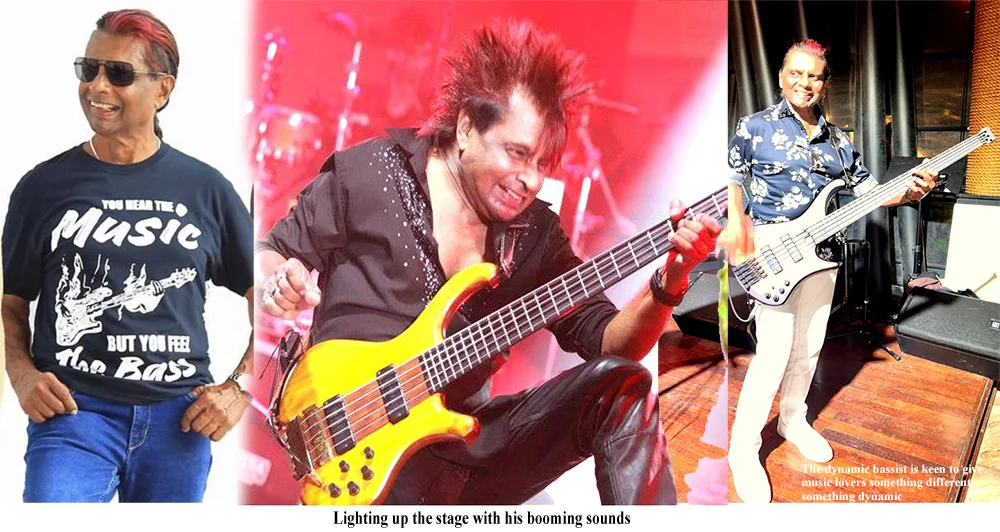
It’s a known fact that whenever bassist Benjy Ranabahu booms into action he literally lights up the stage, and the exciting news I have for music lovers, this week, is that Benjy is coming up with a new vision.
One thought that this exciting bassist may give the music scene a layoff, after his return from the Seychelles early this year.
At that point in time, he indicated to us that he hasn’t quit the music scene, but that he would like to take a break from the showbiz setup.
“I’m taking things easy at the moment…just need to relax and then decide what my future plans would be,” he said.
However, the good news is that Benjy’s future plans would materialise sooner than one thought.
Yes, Benjy is putting together his own band, with a vision to give music lovers something different, something dynamic.
He has already got the lineup to do the needful, he says, and the guys are now working on their repertoire.
The five-piece lineup will include lead, rhythm, bass, keyboards and drums and the plus factor, said Benjy, is that they all sing.
A female vocalist has also been added to this setup, said Benjy.
“She is relatively new to the scene, but with a trained voice, and that means we have something new to offer music lovers.”
The setup met last week and had a frank discussion on how they intend taking on the music scene and everyone seems excited to get on stage and do the needful, Benjy added.
Benjy went on to say that they are now spending their time rehearsing as they are very keen to gel as a team, because their skills and personalities fit together well.
“The guys I’ve got are all extremely talented and skillful in their profession and they have been around for quite a while, performing as professionals, both here and abroad.”
Benjy himself has performed with several top bands in the past and also had his own band – Aquarius.
Aquarius had quite a few foreign contracts, as well, performing in Europe and in the Middle East, and Benjy is now ready to do it again!
-

 Sports2 days ago
Sports2 days agoSri Lanka’s eternal search for the elusive all-rounder
-

 Features6 days ago
Features6 days agoCelebrating 25 Years of Excellence: The Silver Jubilee of SLIIT – PART I
-

 Business6 days ago
Business6 days agoCEB calls for proposals to develop two 50MW wind farm facilities in Mullikulam
-

 Business4 days ago
Business4 days agoAIA Higher Education Scholarships Programme celebrating 30-year journey
-

 News3 days ago
News3 days agoGnanasara Thera urged to reveal masterminds behind Easter Sunday terror attacks
-

 Features6 days ago
Features6 days agoNotes from AKD’s Textbook
-

 News2 days ago
News2 days agoComBank crowned Global Finance Best SME Bank in Sri Lanka for 3rd successive year
-

 Features2 days ago
Features2 days agoSanctions by The Unpunished











